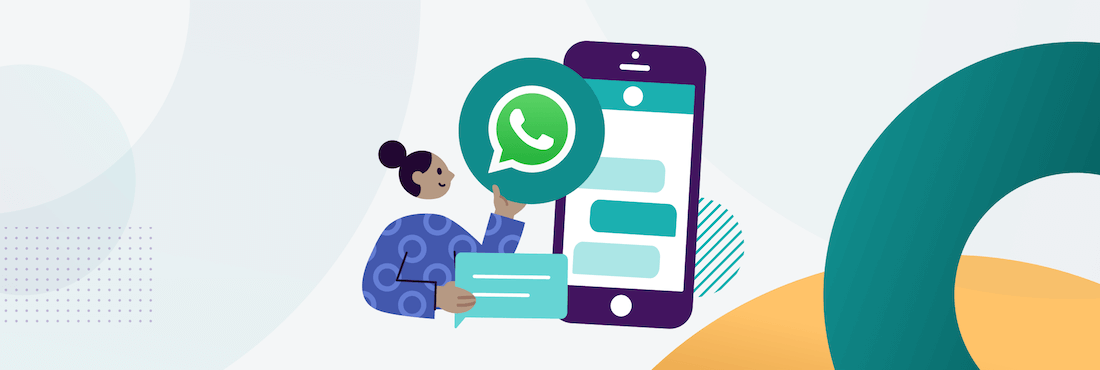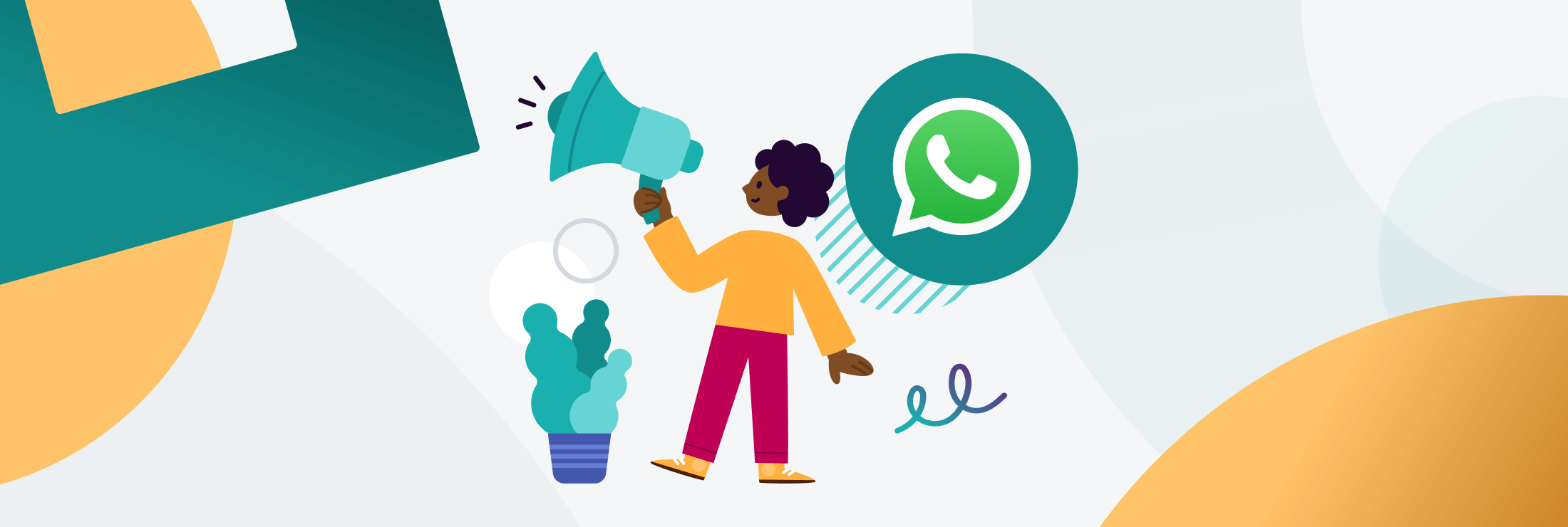
To market your products successfully, you’ll need to make sure your brand is where your customers are. So with more than 2 billion users worldwide, WhatsApp is a great way to drive traffic to your website, generate sales, and build loyalty in a competitive market.
Compared to other channels, WhatsApp feels more familiar, while personalisation tactics like tailored product recommendations, help you to connect with current and potential customers. With the option to create a branded profile, communicate at scale, and share video and pictures, WhatsApp Business Platform is perfect for retail, as this article explains.
Does marketing with WhatsApp in the retail sector actually work?
Retail has always been a fast-paced sector, but the rise of ecommerce companies across the globe means that businesses are continually vying for customers’ attention. It’s easier than ever to send enticing promotions and discounts straight to someone’s mobile – the problem is that it can lead to cluttered inboxes and message fatigue because people receive so many.
The good thing about WhatsApp is that you can easily personalise your messages, so they’re relevant, and provide helpful ‘nudges’ to ease the path to purchase. Buttons like ‘Shop now’ can turn browsers into buyers, or you could send checkout reminders or stock notifications if a customer goes quiet – creating a sense of urgency and FOMO.
[NAME], we’re still holding your items in your basket for you, but don’t wait too long! [PRODUCT] is selling out fast 😱[BUY NOW]
Because WhatsApp messages are interactive by nature (polls, reactions, multimedia, response buttons and suggested replies), the channel boasts high engagement rates. These features can also be tactically used to generate interest in your products, for example, you could send an in-stock notification along with an image carousel, so customers are inspired to click through and purchase.
It also has high open rates (up to 99%) compared to email (21%), so your message is more likely to be seen. Read receipts show your message has landed, while metrics like click-through rates allow you to measure the performance of campaigns and calculate your ROI.
Common retail challenges solved by WhatsApp Business
WhatsApp is ideal for running VIP or loyalty programmes thanks to its personal messaging and interactive features. You could also send event invites, early sales access or exclusive promo codes – all of which help generate a buzz and feeling of exclusivity.
[BRAND]: Hey VIP, the big [SEASON] event is about to start and you get early access 🎉 [LINK]
It can also be used to solve common retail challenges:
- Cart abandonment: Personalised checkout reminders encourage customers to continue to purchase, especially if it’s accompanied by an extra promo.
- Poor engagement: If you’re struggling to engage customers, WhatsApp has features like quick response buttons or suggested replies, which makes it quick and convenient for them. You can also send multimedia like GIFs, pictures and videos to make their experience more memorable.
- Loyalty: Build customer loyalty with personalised messages and behind-the-scenes content to events or sales.
- Customer service: During busy times like Black Friday or Christmas, it’s nearly impossible to respond quickly to all customers. WhatsApp enables you to automate your responses or set up chatbots to answer common customer queries. It also bridges the gap between customer service and marketing teams, ensuring customers have a positive experience no matter how they get in touch.
- Heavy workloads: With many sales and marketing teams under pressure, WhatsApp can be a significant time-saver, and is extremely cost effective. You can manage it alongside other channels such as SMS and email using your communications platform. Furthermore, access to a library of proven templates means your team will spend a minimal amount of time crafting messages.
How to increase sales using WhatsApp
Some of the most common ways to increase sales with WhatsApp include sales alerts, basket reminders or promo codes. There are opportunities to crosssell and upsell, as well as run large-scale campaigns across multiple channels.
WhatsApp is a direct form of communication – and you can easily start a chat with click-to-chat ads on Instagram or Facebook, and by adding QR codes to your website or packaging.
Send rich messages to boost marketing promotions
As well as simple text-based messages, WhatsApp Business Platform offers a number of rich features to enhance your marketing messages and promotions, including:
- Images
- Video
- Audio
- GIFs
- Call-to-action buttons
- Quick replies
- Location
Create bot-driven interactions
WhatsApp Business Platform allows you to run chatbots which send automated responses. Your customers get instant replies to their queries, regardless of the day or time, while your call agents are freed up to concentrate on more complex cases. As well as being a valuable customer service tool, chatbots can also be used in marketing. We’ve seen them used by retailers during the cross/upsell stage of an interaction. Once an action has been completed (e.g. the customer has chosen to ‘learn more’ about a certain product), the bot can then jump in and helpfully suggest complementary products.
Integrate with sales software
WhatsApp Business Platform integrates seamlessly with other software, such as your CRM, which means you can nurture customers throughout their journey.
Personalised customer engagement and promo codes
Sending QR and promotional codes for exclusive discounts via WhatsApp is a great way to persuade customers to buy your products. They can be used to drive specific actions, such as inviting online customers into stores or encouraging them to spend more with a multi-product deal.
Personalising these messages – such as including a first name or sending it around their birthday – promotes higher engagement rates and action.
Tailored product recommendations
By exporting data from your CRM, you can tailor your WhatsApp messages based on a customer’s age, gender and location, as well as their buying products. You can let them know when their favourite product is back in stock, or when it might be time to replace it, and suggest complementary items.
Birthday and anniversary deals
A quick, automated happy birthday or anniversary message with a discount code for a treat, or even a freebie, will help them to feel special. Your brand becomes part of their day, giving them something to enjoy and talk to their friends about.
Happy birthday, [NAME]! Here’s a little gift from us to you – use ITSMYBDAY for 25% off 😍 [SHOP NOW]
Notifications
A well-timed WhatsApp notification can encourage customers to take action in the following cases:
- Cart abandonment
- Sale starting
- Products in (or back in) stock
- Price drops
- Low stock
Of course, you should always ensure messages are relevant and sent with the right frequency, otherwise it’ll look spammy. Remember that WhatsApp is highly-personal and people are likely to opt out of future communications if you bombard them.
Take your first steps to better marketing with WhatsApp Business Platform
The rise of online shopping has fundamentally changed the retail landscape, and brands need to connect with people in new and innovative ways. Thanks to its high open rate, and choice of rich features, WhatsApp creates more engaging shopping experiences that help you stand out from the crowd.
Esendex works with more than 46,000 customers, including household names like JustEat, Siemens and Fujitsu. Find out WhatsApp Business Platform can help you deliver high-performing marketing campaigns, or talk to one of our experts.



